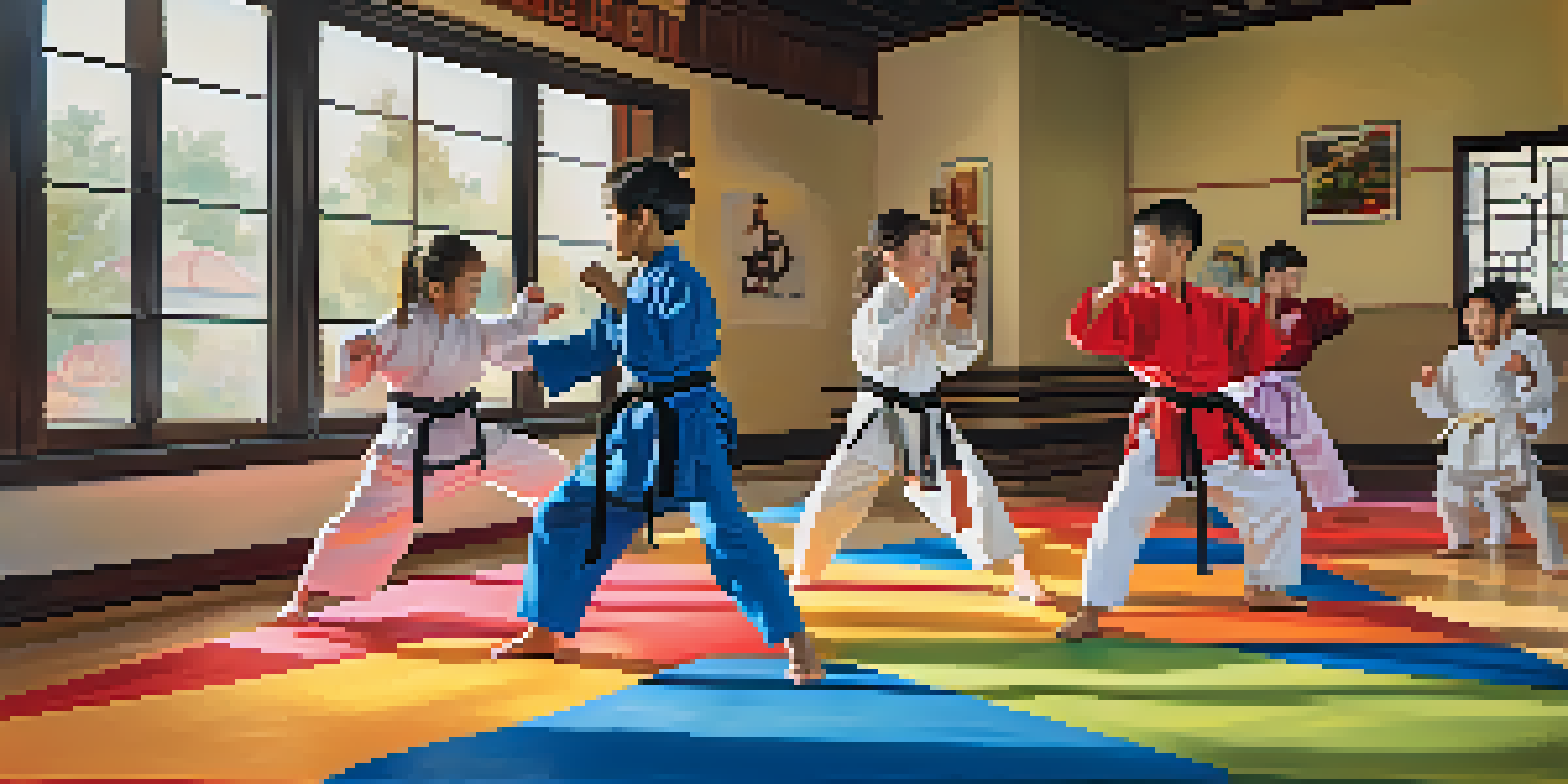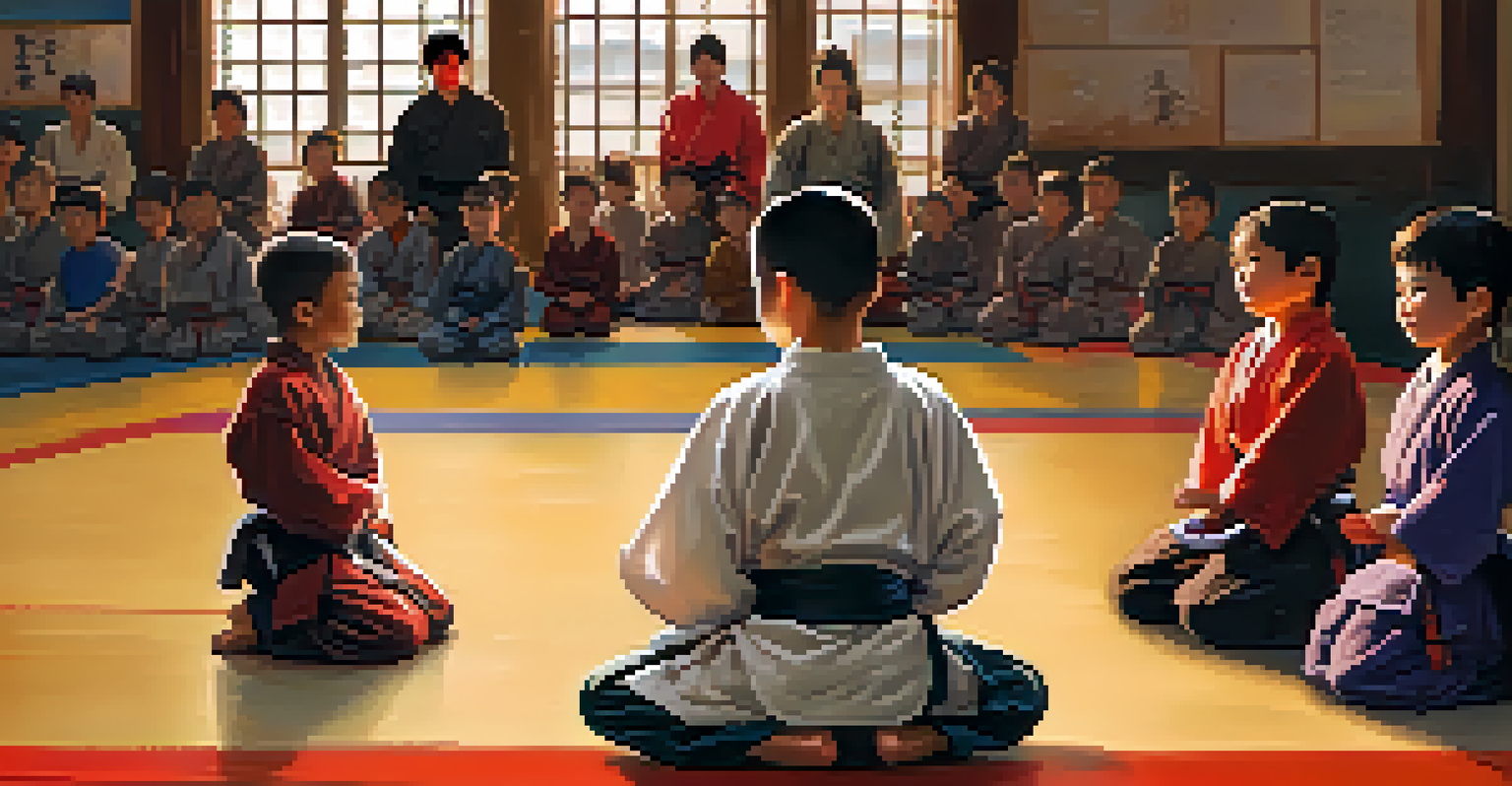Building Confidence in Children Through Martial Arts Training

Understanding Confidence and Its Importance for Kids
Confidence is the belief in one's abilities, which is crucial for children's development. It affects how they approach challenges, interact with peers, and handle failure. When children feel confident, they are more likely to take risks, try new things, and pursue their goals.
Confidence is not about being the best. It’s about being your best.
Building confidence in children can lead to better academic performance and social interactions. Kids who trust themselves are often more resilient and adaptable to change. This foundational sense of self-worth helps them navigate the ups and downs of growing up.
Martial arts offers an effective avenue for cultivating this confidence. Through structured training and support, children learn to believe in their capabilities, enhancing their overall self-esteem.
How Martial Arts Classes Encourage Self-Discipline
Martial arts training reinforces the concept of self-discipline, which is essential for building confidence. Children learn to set goals, practice regularly, and stay committed to their training. This discipline translates into other areas of their lives, such as schoolwork and personal responsibilities.

For instance, a child who practices a new technique diligently is likely to see improvement over time. This progress boosts their self-esteem, as they realize that hard work leads to tangible results. The sense of accomplishment reinforces their belief in their abilities.
Confidence Boost Through Martial Arts
Martial arts training helps children develop confidence by encouraging them to trust in their abilities and take on challenges.
Moreover, self-discipline fosters resilience. When kids encounter setbacks in their training, they learn to persevere, which further strengthens their confidence.
Developing Social Skills Through Team Activities
Martial arts classes often involve partner drills and group activities, which are excellent for developing social skills. Children learn to communicate, cooperate, and support one another, fostering a sense of community. This social interaction can significantly boost their confidence in dealing with peers.
Success is the sum of small efforts, repeated day in and day out.
When kids engage in these activities, they also experience the joy of teamwork. They learn to celebrate each other's successes and offer encouragement during challenges. This supportive environment helps them feel valued and understood, leading to higher self-esteem.
Additionally, these classes often include diverse groups of children, allowing them to interact with peers from various backgrounds. This exposure helps them build empathy and understanding, further enhancing their social confidence.
Setting and Achieving Goals in Martial Arts
Goal-setting is a fundamental aspect of martial arts training. Kids start by learning basic techniques and gradually work their way up to more advanced skills. Each achievement, whether it’s mastering a new move or earning a belt, contributes to their overall confidence.
As children set their sights on specific goals, they learn the value of hard work and dedication. Achieving these milestones provides a sense of pride that boosts their self-esteem. It reinforces the idea that they are capable of accomplishing what they set out to do.
Self-Discipline and Goal Achievement
Through structured training, kids learn self-discipline and the importance of setting and achieving goals, contributing to their self-esteem.
Moreover, the structured nature of martial arts allows kids to see their progress over time. This visible improvement instills a belief in their potential, motivating them to set even higher goals in the future.
Learning Respect and Discipline in Martial Arts
Respect and discipline are core values taught in martial arts. Children learn to respect their instructors, peers, and the art itself. This understanding fosters a positive mindset that enhances their confidence both in and out of the dojo.
Practicing respect helps children develop humility and empathy. They learn that everyone is on their own journey, which encourages them to support others rather than compare themselves negatively. This shift in perspective can significantly improve their self-image.
Discipline is equally important, as it requires children to follow rules and adhere to a code of conduct. This structure teaches them accountability and self-control, further contributing to their growing confidence.
Building Physical Fitness and Mental Resilience
Martial arts training promotes physical fitness, which has a direct link to confidence. As children become stronger and more agile, they feel better about their bodies. This improvement in physical health often leads to enhanced self-esteem and body image.
In addition to physical benefits, martial arts also cultivates mental resilience. Children face challenges during training, such as sparring or learning complex techniques. Overcoming these obstacles teaches them to handle stress and setbacks, building their mental strength.
Social Skills and Teamwork Growth
Participating in martial arts fosters social skills and teamwork, allowing children to build connections and empathy with their peers.
This combination of physical and mental growth creates a well-rounded individual. Kids who feel good physically and mentally are more likely to approach life’s challenges with confidence and positivity.
The Role of Positive Reinforcement in Martial Arts
Positive reinforcement plays a significant role in martial arts training. Instructors often celebrate students' achievements, no matter how small. This acknowledgment encourages children to keep pushing themselves and reinforces their belief in their abilities.
When children receive praise for their efforts, it boosts their motivation to continue improving. They learn that their hard work is recognized, which helps them feel valued and confident. This positive cycle creates a supportive learning environment.

Additionally, the camaraderie among classmates fosters a sense of belonging. When children feel supported by their peers and instructors, their confidence naturally flourishes.
Conclusion: Empowering Kids Through Martial Arts
In conclusion, martial arts provides a powerful platform for building confidence in children. Through self-discipline, social interaction, goal-setting, and positive reinforcement, kids learn to trust in their abilities. This newfound confidence extends beyond the dojo, impacting their academic and social lives.
As children engage in martial arts, they develop not only physical skills but also essential life skills. They learn resilience, respect, and the importance of hard work, all of which contribute to a strong sense of self-worth. Ultimately, martial arts empowers children to face life's challenges with confidence.
Encouraging your child to participate in martial arts could be one of the best decisions for their personal growth. It's not just about kicks and punches; it's about building a foundation for a confident, successful future.